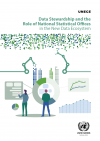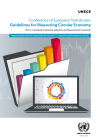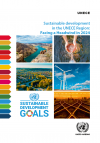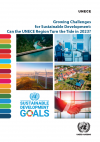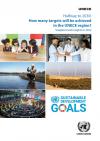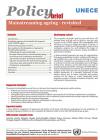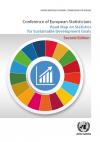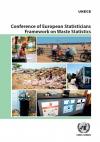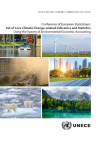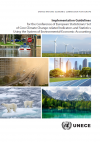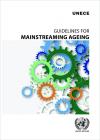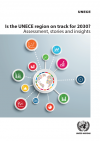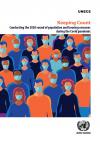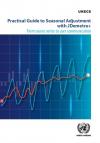Publications
Displaying Results 1 - 20 of 128
- English
The rapidly evolving landscape of data production and sharing is an opportunity for national statistical offices to reconsider their position in the national data ecosystem and take on a broader role as a provider of data services. A concept often used in association with this changing role is data stewardship. The publication defines and explains data stewardship and other related foundational
- English
In the past two decades, many countries and the European Union have been orienting their waste and materials management policies towards preventive and integrated approaches, with emphasis on the life-cycle and supply chains of materials and products. Policy initiatives aimed at establishing a circular economy (CE) have increased as an essential contribution to a sustainable, low carbon, resource
- English
ONLINE PUBLICATION
This publication provides the 2024 progress assessment on the Sustainable Development Goals (SDGs) in the region of the United Nations Economic Commission for Europe (UNECE), based on the data available in the United Nations Global SDG Indicators Database.
The results are presented at the regional level, identifying
- English
UNECE Policy Brief on Ageing No. 28
At any age, intersecting factors such as poverty, disability, social isolation and exposure to abuse can increase the risk of vulnerability and weaken resilience in the case of adverse events. The COVID-19 pandemic, rising inflation, natural disasters, and war are examples of adverse events that have disproportionately affected vulnerable persons, including
- English
ONLINE PUBLICATION
This publication provides a progress assessment on the Sustainable Development Goals (SDGs) in the region of the United Nations Economic Commission for Europe (UNECE), based on the data available in the United Nations Global SDG Indicators Database.
The results are presented at the regional level, identifying the SDG targets that the
- English
The 2022 UNECE Ministerial Conference on Ageing (Rome, Italy, 16-17 June 2022) concluded the fourth cycle of review and appraisal of the Madrid International Plan of Action on Ageing (MIPAA) and its Regional Implementation Strategy (RIS).
These proceedings provide a summary of the Conference deliberations, as well as a synthesis of the policy progress made between 2017 and 2022 to advance active
- English
The Madrid International Plan of Action on Ageing (MIPAA), adopted at the Second World Assembly on Ageing in April 2002, set a comprehensive and bold agenda for ageing-related policies in the 21st century. With the UNECE Regional Implementation Strategy for MIPAA adopted in Berlin the same year, countries drew a roadmap for creating a society for all ages in the region.
This report, issued to
- English
ONLINE PUBLICATION
This publication provides a progress assessment on the Sustainable Development Goals (SDGs) in the region of the United Nations Economic Commission for Europe (UNECE), based on the data available in the United Nations Global SDG Indicators Database.
The assessment identifies targets on which the overall progress in
- English
The population of the UNECE region is ageing: one in four people will be 65 years old or above by 2050 compared to one in six today. Population ageing has social and economic implications for which societies need to prepare. This requires a coordinated, whole-of-government and whole-of-society effort to bring societies and economies into harmony with demographic change, otherwise known as ‘
- English
The second edition of the Road Map on Statistics for SDGs aims to provide guidance to members of national statistical systems and other stakeholders on how to best navigate the complex task of measuring the achievement of the goals and targets of the 2030 Agenda. By doing so, it strives to strengthen reliable data-based national information systems and support efforts to achieve the Goals.
The
- English
Official waste statistics have been produced for more than 40 years. They were initially developed to monitor and manage threats to human health and the environment. More recently, information needs have shifted toward realizing the economic value of waste, particularly in the context of the “circular economy”. This change has created demand for information on waste types that have not
- English
Climate change is an existential threat and provides an immense challenge for humanity. A better understanding of all its aspects, through monitoring, modelling, analysis and reporting, is crucial to decide on the best course of action.
This document presents a set of core internationally comparable climate change-related indicators and statistics, developed by a dedicated UNECE Task Force
- English
This document provides practical guidelines on how to implement the Conference of European Statisticians’ Core Set of Climate Change-Related Indicators (CES Indicator Set), taking into account national policy priorities and data availability. It
- English
The most recent in the series of Policy Briefs on Ageing is "Mainstreaming Ageing - Revisited"Unofficial translation (GER)
See all "
- English
Mainstreaming ageing is a policy strategy directed towards integrating ageing issues into all relevant policy fields on all levels, which helps to adapt to population ageing and ensure the integration of the needs of all ages groups, including older persons, into the policymaking process.
The Guidelines for Mainstreaming Ageing outline five stages that support countries in establishing a
- English
This report provides a progress assessment on the Sustainable Development Goals (SDGs) in the region of the United Nations Economic Commission for Europe (UNECE), based on the data available in the United Nations Global SDG Indicators Database and on the statistical methodology commonly used by all five United Nations regional commissions.
The assessment identifies targets on which the overall
- English
When the Covid-19 pandemic broke out in March 2020, preparations for the 2020 round of population and housing censuses were well underway in countries across the UNECE region: some were already in the field, while the majority were in the advanced stages of planning for a 2021 census.
The impacts of the pandemic on census-taking have been wide ranging; from the need for social distancing in
- English
This Guide introduces seasonal adjustment and gives practical guidance to national statistical offices in producing seasonal adjusted monthly or quarterly time series covering all steps in the production process, from the evaluation of the original data series to the dissemination and communication of the seasonally adjusted series. The Guide can be used in introducing new staff to seasonal
- English
The idea of viewing human knowledge and abilities as an asset and to estimate its value is not new but has gained more prominence in recent years. ln 2016, the United Nations Economic Commission for Europe (UNECE) published the "Guide on Measuring Human Capital"with the objective of pursuing the conceptual development of human capital measurement and with a particular focus on
- English
Many countries and regions are facing two increasingly stark trends: rapid urbanization and a growing number of natural disasters caused by climate change-related hazards. Combined, they substantially increase the risk to which many people are exposed.
The increasing number and magnitude of disasters and their impacts on people, the economy and the environment have led to the adoption of global


